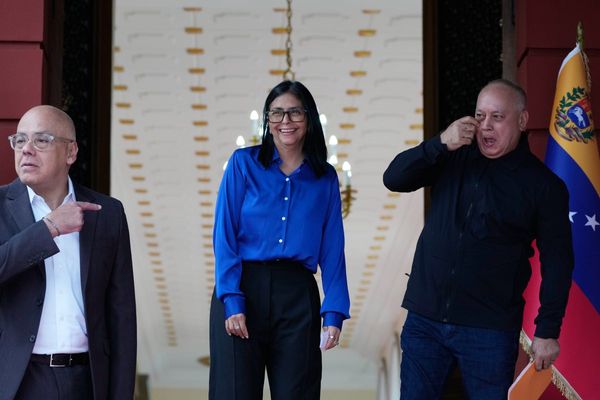Thousands across Australia took to the streets on the weekend to protest against the United States Roe v Wade ruling, with some afraid that Australia's laws protecting a person's rights to abortion were "fragile".
At a rally in Melbourne, Ilsa Evans, an academic and successful author, held a placard with the words "my two daughters would not exist if not for my 1986 abortion".
"When I wrote the sign, I must admit I had some misgivings. And I think it was because of those misgivings that I thought the sign was even more important," Ilsa told the ABC News Daily podcast.
In 1986, Ilsa was a single mother with a five-year-old son and was in a difficult relationship. She made the heart-wrenching decision to abort a pregnancy.
"It was a really, really hard decision.
"It was not a situation I expected myself to be in, but if I had have gone through with that pregnancy, it would have changed the trajectory of what eventuated personally after that and the relationship that gave rise to the two daughters wouldn't have existed."
Roe v Wade is a landmark ruling that protected Americans' constitutional right to abortion for nearly 50 years.
It was overturned by the US Supreme Court late last month.
Protests were arranged in cities around Australia. Ilsa Evans attended the Melbourne rally with one of her daughters with a sense of "passing on the baton".
"There was frustration that I've marched for this sort of thing before and I thought it was all done, and now we are doing it again and I'm passing it on to the next generation."
She said she attended the rally not only in a show of solidarity with women in the US but because she believes abortion rights in Australia are "fragile".
"If we look at the Australian landscape, we have in WA abortion still being regulated by the Criminal Code, South Australia only recently decriminalised abortion, I think it was Northern Territory only last year and New South Wales in 2019," she said.
"So these advances are relatively new and there's a fragility around that.
Roe v Wade sparks debate in Australia
The United States and Australia deal with abortion in very different ways, and it would be "highly unlikely" abortion laws in Australia would be reconfigured.
But experts like Dr Prudence Flowers believe Australians have a right to be concerned.
"I think it's very easy to overlook the fact that until very recently there were states and territories in Australia where abortion was still in the criminal code," said Dr Flowers, a senior lecturer in US history at Flinders University who has extensively studied reproductive laws in America and Australia.
She notes Western Australia is the only remaining state where abortion remains under the criminal code.
"In the last five years we've seen multiple states and territories decriminalise abortion and this is really, really recent."
Dr Flowers said while surveys show around 80 per cent of Australians support abortion, there is intense debate surrounding decriminalisation.
"In every state with decriminalising, you saw state and federal politicians saying, you know, frankly untrue and often really stigmatising things about abortion care, many of them kind of copying the language of someone like Donald Trump."
New abortion laws are set to come into force in South Australia this week.
Liberal leader David Speirs, along with three other members of the shadow ministry, was involved in organising a pro-life "training" event on the weekend aimed at encouraging young people to "fight for the human rights of the unborn".
Mr Speirs later pulled out because of the protests.
Dr Flowers said the Roe v Wade ruling in the US has led anti-abortion campaigners to revoice concerns.
She pointed to commentary from the Nationals MP Matt Canavan, who argues Australia is only one of six nations that allow "late-term abortions".
"Matt Canavan tweeted a thing over the last few days about how Queensland's gestational upper limit put it out of step with most of the world and that that law needed to be revisited," Dr Flowers said.
The gestational upper limit refers to the point in pregnancy women are legally able to have an abortion.
That limit differs in state and territories and ranges from 22 weeks and six days in South Australia, to 24 weeks in Victoria, 22 weeks in NSW and Queensland.
Western Australia and Tasmania have the lowest upper limits of 20 and 16 weeks respectively, while the ACT has no limit at all.
"In many states we see situations where prominent anti-choice politicians are saying we should be revisiting these decriminalisation bills, we should be shutting off access, we should be reducing when abortion can be accessed," Dr Flowers said.
"And those are all strategies that emerged in the US."
Abortions hard to access and expensive
Dr Flowers points to other periods in Australian political history where reproductive health has been used as a political negotiating tool.
"Probably the most famous example of that is from the 1990s when John Howard was keen to privatise Telstra and to get that done he struck a bargain with Senator Brian Harradine, who was from Tasmania, to essentially ban RU486, which is early medication abortion."
RU486, or the abortion pill, was not registered for use in Australia until 2012, compared to the early 90s in Great Britain and the year 2000 in America.
She notes RU486 is still more regulated here than in other Western nations, as not every doctor can prescribe the pill and not every pharmacy can dispense it.
"Tony Abbott when he was health minister under (John) Howard, led a few unsuccessful attempts to kind of push abortion funding out of Medicare.
"There were quite concerted efforts at various points to make abortion not something that was publicly provided or to make certain types of abortion not accessible."
During rallies on the weekend, protesters were also voicing concern about access to abortion for Australians.
Dr Flowers noted Medicare only covered a fraction of the cost of an abortion and public hospitals did not provide the procedure, except in South Australia and the Northern Territory.
"Quite straightforward early abortion costs a minimum of $500 out of pocket and often a lot more," she said.
Ilsa Evans described access to abortion in Australia is like a "postcode lottery".
"I mean, women in rural areas, also women who are on temporary visas, for instance, Aboriginal and Torres Strait Islander women, marginalised groups have particularly, you know, issues around access.
"So there's a long way to go in Australia still, even though we are in a much, much better place than the US."
As for her message for American women, Ilsa says she hopes they've seen the images of the thousands of Australian women protesting against the reversal on the weekend.
"We're with you. We see you. We wish you all the best."







